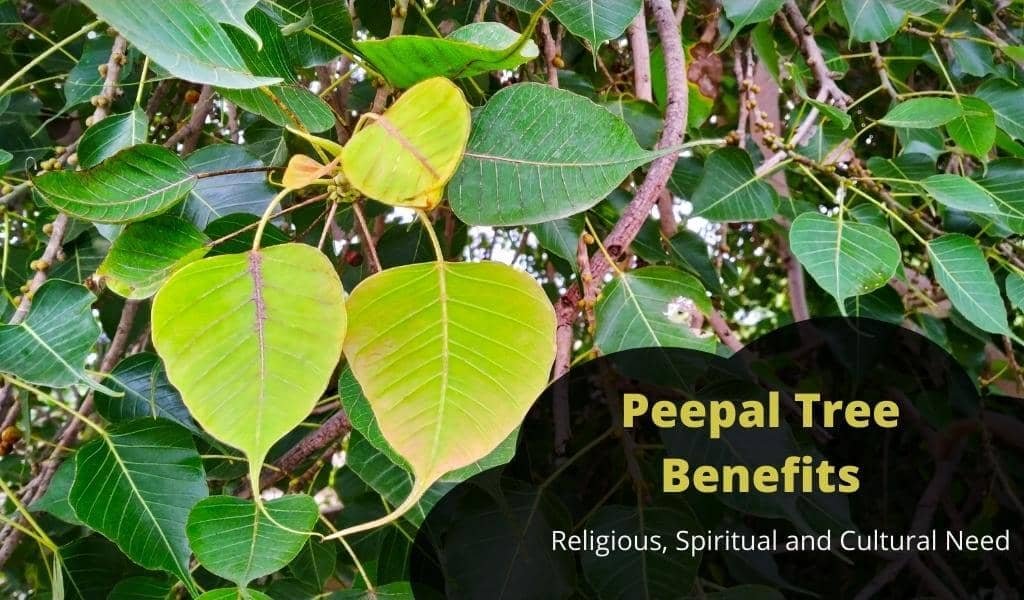The Peepal tree (also known as ‘Bodhi Tree‘) is popularly believed in Hinduism, Jainism, and Buddhism. Gautam Buddha gained enlightenment under this famous deciduous tree in India. This tree represents the infinite expanse of the Universe.
The Ficus religiosa is a real “Tree of Life.” Unlike other trees, it releases oxygen even at night. Each portion of the Pipal tree is good for healing various health problems and disorders. This tree may store various diseases, including diarrhoea, epilepsy, and stomach problems.
Peepal Tree (Ficus Religiosa or Sacred fig)
The Peepal tree is regarded as a sacred tree in both Hinduism and Buddhism in India. It not only emits oxygen but also has other medicinal benefits. It is a fig tree variety from the mulberry family. It has large medicinal leaves that were used in both mainstream medicine and Ayurveda treatment.
The Piplo (Ficus religiosa) tree has medicinal properties in its bark, branches, and roots, and it is a very profitable plant. Various parts of the Piplo tree, such as the root bark, stem bark, roots, leaves, and fruits, are used to treat diseases such as high blood sugar, costiveness, and asthma.
The Pipalo is helpful in treating skin disorders. The topical use of Piplo tree leaf decoction in the form of ointment aids in the healing of injuries. Because of its anti-inflammatory qualities, it assists in reducing the irritation related with eczema.
Historical Background of Peepal
The Peepal tree is regarded as having a historical importance and spiritual consequence in ancient times and present times. This is because no additional tree in the world is recognized to have the identical lifespan as the Piplo tree.
These trees can live up to 3000 years and are recognized as enlightening trees by Buddhism, Jainism, and Hinduism. Moreover, various historical associates in different languages intimate that sages, yogis, and buddhas sit under a Pipalo tree and meditate to achieve enlightenment, peace, and serenity.
Prince Siddhartha (Gautama Buddha) was born to a dignified aristocratic family described the Kshatriyas in Lumbini, had succeeded enlightenment while meditating under a peepal tree; thus, it’s called Bodhi Tree.
It is a source of joy that the Jaya Sri Maha Bodhi tree is the world’s oldest plant to date. The peepal tree is linked to three main Hindu deities Brahma, Vishnu, and Shiva, and it is considered that Vishnu was born under the Pipalo tree.
In the past, Village Panchayat Conferences were mostly held under Pimpal Tree, as mature peepal trees provide ample shade. The sacred fig tree has long been revered as a sign of happiness, great luck, persistence, and prosperity.
Synonyms of Pipal Tree
Ficus religiosa, Pippala, Ahant, Asvattha, Ashud, Ashvattha, Piplo, Jari, Piparo, Pipalo, Pipala, Pipal, Arlo, Ranji, Basri, Ashvatthanara, Ashwatha, Aralimara, Ashvathamara, Basari, Ashvattha, Bad, Arayal, Pimpal, Pippal, Aswatha, Ashwarthan, Arasamaram, Arasan, Arasu, Arara, Ravichettu.
Therapeutic Potentials of Different Parts of The Pimpal
- Plant Parts: Traditional uses
- Bark: Diarrhea, dysentery, anti-inflammatory, anti-bacterial, cooling, astringent, gonorrhea, burns
- Leaves: Hiccups, vomiting, cooling, gonorrhea
- Shoots: Purgative, wounds, skin disease
- Leaf Juice: Asthma, cough, diarrhea, gastric problems
- Dried fruit: Fever, tuberculosis, paralysis
- Seeds: Refrigerant, laxative
Health Benefits of Peepal Tree
According to science, every part of the Peepal tree – the leaf, bark, shoot, seeds, and fruit- has several medicinal benefits. It is being utilized since ancient times to heal numerous diseases.
This List below mentioned are some of the most popular health benefits of using the Pimpal into our daily life.
1. Diarrhoea
The Piplo is said to be an effective diarrhoea remedy. Diarrhoea is classified as Atisar in Ayurveda, and it can occur for a variety of reasons.
These constituents aggravate the Vata, which causes fluid to be produced in the colon, causing the stool to be digested and become loose and watery, which is a symptom of diarrhoea.
Due to its Kashaya or astringent and Sangrahi or absorbent properties, peepal bark powder is valued for regulating water loss from the body and making the stool more abundant.
Tips for Usage
- Prefer 2-4 grams of Peepal bark powder.
- Add it to 1 cup of water and boil for 10 minutes till the liquid lessens to ¼ of its original quantity.
- Strive it and have 15-20 ml twice a day (or as instructed by the physician).
2. Menorrhagia
Menorrhagia, or excessive menstrual blood movement, is also known as Raktapradar, or heavy menstrual bleeding. This is caused by an aggravated Pitta dosha, according to Ayurveda.
Due to its Sita or cool and Kashaya or astringent qualities, peepal bark helps to balance this inflamed Pitta dosha and decreases heavy menstrual bleeding.
Tips for Usage
- Prefer 1-1.5 grams of Peepal bark powder (or as directed by the physician).
- Consume with water once or twice a day to obtain the wanted outcome
3. Constipation
Constipation, acidity, and other digestive effects caused by Vata and Pitta Doshas are well treated by Peepal leaf juice. It aids in the effective elimination of surplus products from the large intestine. The juice produced by boiling the leaves retains laxative effects and cleanses the intestines.
Tips for Usage
- Take 5-10ml (or as instructed by physician) of Peepal leaves juice.
- Mix it with light hot water has it before going to bed to obtain rid of constipation.
4. Epistaxis
Epistaxis regards bleeding from the nose. Nasal bleeding intimates an aggravation of the Pitta dosh, according to Ayurveda. Peepal is admitted to be a beneficial natural herb to regulate nasal bleeding as its Kashaya or astringent nature supports thicken the blood, inhibiting the bleeding. It promotes reducing inflammation because of its anti-inflammatory qualities, which emerge from its Sita or cold nature.
Tips for Usage
- Place 1-2 drops of Peepal juice into each nostril to constrain the bleeding (or as directed by the physician).
Potential Health Benefits of Peepal
- Inhibits Cancer Cell Growth
Studies prove that all portions from the Peepal tree, including root, bark, leaf, fruit have anti-cancer attributes. The essence collected from this plant has anti-proliferative influences. They are extremely efficient in biochemical mechanisms such as improving apoptosis, restraining cancer cell circulation and containing cell proliferation. The decoction obtained from peepal leaves includes bioactive ingredients that stimulate the process of apoptosis within cancer cells by creating reactive oxygen varieties.
- Treats Asthma
Asthma is a respiratory disease produced by the buildup of mucus in the lungs and airways to prevent oxygen from reaching the lungs and other organs in the body. Asthma in both children and seniors can be kept by the bioactive elements existing in the leaves of the peepal tree. Chronic Asthma can be remedied promptly by powdering the leaves, boiling them in milk, and drinking them twice a day. Not only leaves, Pimpal fruits and bark additionally offer to the treatment of Asthma.
- Relieves Eczema
Eczema is a skin disease with skin swelling, red/white spots, cracks, itching, etc. The bark collected from the trunks of the Peepal tree has healing impacts on Eczema and gives a cooling outcome on the skin. Finely grind the bark of this plant and use 50g of it and blend it with ghee and lime to create a paste. Utilizing this paste periodic to the afflicted areas will diminish the collision of Eczema.
- Lowers Blood Sugar Level
Pimpal can assist manage diabetes efficiently. Diabetes is the most basic condition that happens in one in 5 people today. It’s not a disorder but a situation of blood sugar variations. High or low blood sugar can reach many health obstacles, so keeping your blood sugar level stable is crucial. It is also probable to reduce blood sugar by taking Pimpal fruit powder and Haritaki fruit powder adequately.
Uses of Peepal Tree
Peepal tree is utilized in a various ways. Apart from being utilized for medicinal objectives in mainstream medicine, it is also a great part of ayurvedic medicines and approaches. It can also be used to manage headaches and malaria, along with skin difficulties. Numerous religious and spiritual people practice this tree to meditate, and the Buddha also gained enlightenment under this tree.
Side-Effects & Allergies
The Pimpal tree is entirely organic, and there are no obvious side outcomes to utilizing it. However, people sensitive to allergies should perform a patch test before utilizing it to decide whether or not it is safe to practice. It would help if you always discussed with your doctor before attaching anything new to your nutrition or lifestyle in common.
Summary
The Peepal tree, also recognized as Bodhi Satva Vruksha, continues a major religious, spiritual significance. Distinguished for its therapeutic properties, the bark, roots, leaves, fruits of this wonder tree are utilized broadly in Ayurveda for managing lung disorders, skin diseases and different digestive problems. However, if you propose to adopt the juice of Pimpal tree bark or leaves, must consult with your doctor first.
Hope you enjoyed reading the guide. If you think we missed something or have a suggestion, please leave it in the comments section below.
If you are searching fresh and live houseplants online then checkout our extensive collection of amazing indoor and outdoor houseplants.

